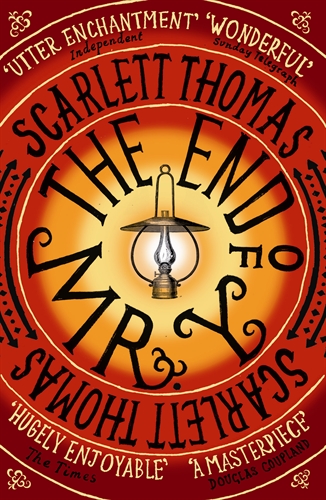 The End Of Mr. Y
The End Of Mr. Y is a book that gets your attention from the moment you first see it; and by book, I don’t mean plot, characters, or writing (although all these will later work their charms), but book as physical object. A lump of paper1. The cover is a bright red, dominated by swirling text, and the edges of the pages are black. It looks terrific; and like all the best design, its form is following a function.
1. In which there are minor spoilers because I talk about the plot
The End of Mr Y is about a supposedly cursed Victorian novel. The heroine, PhD student Ariel Manto, finds a copy within the first few pages. She doesn’t spend long prevaricating about whether to read it, and neither do you – several large sections of Mr Y are transposed directly into the text of the novel. The novel-within-a-novel is about Mr Y, a well-to-do businessman who goes to a circus, buys a potion from a mysterious doctor and finds that it allows him to travel into the ‘Troposphere’, a bizarre alternate world seemingly constructed from other people’s consciousnesses. When Mr Y wakes up, the doctor is gone – along with the potion. For the rest of his life, Mr Y finds himself consumed with the desire to find him and get back into the Troposphere.
Back in the real world (or not) Ariel finds herself sucked into the very same quest when she finds that the page in the book which describes the potion has been ripped out. Then she also has to contend with the disappearance of people she knows and there’s a couple of very shady men asking her acquaintances questions about her whereabouts. The plot really works – Mr Y isn’t a slow read, and the action propels you through the pages at a satisfyingly rapid pace.
2. I didn’t notice Ariel Manto is an anagram of ‘I am not real’
Oh, it’s meta alright. The End of Mr Y isn’t afraid to prod and poke at its own fabric, to talk about the nature of words, reality and reading, about what it really means live vicariously through a story:
‘Would you read a cursed book, if you had one? If you heard that there was a cursed book out there and you found it in a bookshop, would you spend the last of your money on it?… I think about my conversation with Wolf last night and wonder if life is as simple as ‘there is a book’. But again I think about stories and their logic and wonder if there can be any such thing as simply ‘there is a book’. Once upon a time there was a book. That makes more sense. There is a book. And then what happens? There is a book and it contains a curse and then you read it and then you die. That’s a proper story.’
At its best, this self-questioning produces writing full of weird resonances, echoes and reflections, with a tone that’s menacing and playful, thought provoking but light enough on its feet to keep moving. At its worst, there are large portions of philosophy recounted as dialogue (‘well this is what Derrida reckons’) which explicitly – and deadeningly – spell out the various options for the philosophical contortions of the plot.
3. D’You Know What I Mean?
Written in transient present-tense, the writing seems imbued with a purposefully unreal blankness; you get a real sense of the way Ariel is ever more tempted to leave ‘reality’ behind and live solely in the mind. It’s also clear, which is important given the way the book wants to push beneath the surface of plot and narrative and meaning. I did get really annoyed with the realistic dialogue, peppered as it is with ‘yeahs’ and ‘but then again’ – it seems purposefully anti-intellectual, as if the book (or its editors) are slightly afraid of its IQ, shy about its commitment to big questions. The prose can feel inert, too – I was never quite convinced by Arial as a real person. She wears her influences, experiences and viewpoints as if they’re clothes and she’s a the shop dummy: they have a shape, a realistic outline, but they don’t – can’t – move right. I cared about her; I was just never sure what she’d be like if we were sitting next to each other on the Clapham omnibus.
4. In The End
I liked the ending, a lot, and looking back on the book, it really cements its strengths.
5. Best Bit
It feels modern. Fractured, from a mind that knows what a hyperlink is. Too many books written by contemporary authors feel like they’re from a time when computers ran on punchcards.
6. In 6 words
A mind alive on the shelf.1
1Someone else said that.
One thought on “The End of Mr Y”